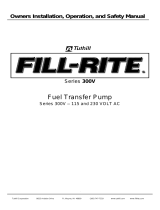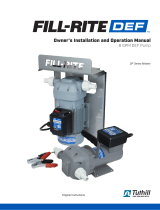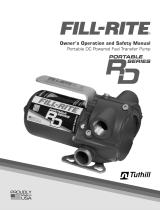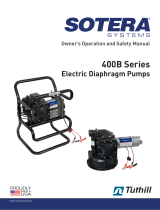
1
OWNERS OPERATION & SAFETY MANUAL
The Most Trusted Name in Pumps and Meters
FR1612 FR1614 FR1616
Electrical shock hazard!
Improper use or installation of this product
can cause serious bodily injury or death!
Electrical wiring should be done by a
licensed electrician in compliance with the
local, state, and national electrical code,
ANSI/NFPA 70, 30, 30A as appropriate.
NOT FOR USE WITH GASOLINE OR ALCOHOL!
Not for use in hazardous locations
Improper use or installation of this product can cause serious
bodily injury or death!
Do NOT smoke near pump or use pump near open flame.
Do not use this product for fluid transfer into aircraft.
This product is not suited for use with fluids for human
consumption or fluids containing water.
Do not dispense fluid that is thicker than diesel fuel. Motor
may overheat!
Disconnect power connections PRIOR to replacing fuse!
Noise emission during bypass mode generates up to 81 dB(A)
within one meter distance of the pump.
DANGER!
12 VDC Diesel Fuel Transfer Pumps
WARNING!
SAFETY INSTRUCTIONS!
To ensure safe operation safe and efficient operation, it is
essential to read and follow each of these warnings and
precautions.
Disconnect power to pump before servicing.
A diesel compatible filter should be used on pump outlet to
ensure that no foreign material is transferred to the fuel tank.
The pump power cable is equipped with an electrical fuse. If
the fuse burns out switch the pump off, disconnect from power,
and look for the cause of the failure. Once the cause of failure
has been remedied, replace with a 30 amp fuse.
Tank or barrel should be anchored to prevent tipping in both
the full and empty conditions.
The pump should never be left unattended while running. Once
the nozzle lever is closed, the pump should be shut off
immediately.
General Description
The Tuthill FR1612 is a positive displacement, rotary vane pump.
The pump is designed to run on 12VDC power and supply a flow rate
of up to 10 GPM (40 LPM) with diesel fuel. The FR1614 &, FR1616
systems consist of the FR1612 pump with accessories.
Tuthill Corporation
8825 Aviation Drive
Ft. Wayne, IN 46809
PH: 260-747-7529
FAX: 800-866-4861
www.tuthill.com
FR1612 Figure 1
FR1614 Figure 2
FR1616 Figure 3

2
MECHANICAL INSTALLATION INSTRUCTIONS
DO NOT install additional foot valves or check valves unless they
have a pressure relief valve set at 50 psi or less.
Use oil resistant pipe sealant or PTFE tape on all pipe threads.
Model FR1612
1. Select inlet and outlet hoses or pipes compatible with diesel that
can withstand at least 50psi. Ports are 3/4” NPT. Tighten fittings
securely to a liquid tight seal.
2. Install the strainer provided at the inlet to the suction hose to
prevent debris from being drawn into the pump.
3. Use a nozzle or valve at the end of the discharge hose that can be
shut off tightly to prevent accidental siphoning when the pump is not
in use.
Model FR1614
1. Install components as shown in Figure 2. Note the direction of flow
cast into the front of the pump to determine inlet and outlet.
2. If it is difficult to press the hoses over the barbs, soften the hose by
soaking it in hot water for 20 seconds, then slip it over the barbs.
3. Tighten hose clamps securely to provide a liquid tight seal.
Model FR1616
1. Install components as shown in Figure 3. Note the direction of flow
cast into the front of the pump to determine inlet and outlet.
2. If it is difficult to press the hoses over the barbs, soften the hose by
soaking it in hot water for 20 seconds, then slip it over the barbs.
3. Tighten hose clamps securely to provide a liquid tight seal. Tighten
the suction tube into the pump (use PTFE sealant tape).
4. Extend the poly suction tube to a length that will place it a minimum
of 3” from the bottom of the tank or barrel.
5. Thread the poly bung into the opening and tighten securely.
ELECTRICAL INSTALLATION FOR ALL MODELS
Connect the battery clips provided to a suitable 12 Volt DC supply
capable of delivering the necessary current and voltage.
The red clip is attached to the positive (+) battery terminal.
Black clip is attached to the negative (-) battery terminal or the
vehicle frame.
DO NOT employ a patch cord to extend the cables. If the cable
provided is not long enough, have it replaced by an authorized
electrician.
The pump may be powered by a battery charger of suitable voltage.
To prevent possible fire from sparks, never connect the terminals
from the battery charger to the pump directly. Always connect the
battery clips from the pump to the terminals on the charger.
PUMP CHARACTERISTICS
The above flow curve is a guide for pump performance only.
Attachment of accessories, changes in fluid pumped, and
temperature will affect flow rate delivered.
OPERATING INSTRUCTIONS
1. Insert nozzle into container to be filled.
2. Switch pump on.
3. Operate nozzle lever to dispense fluid.
4. When the desired amount of fluid has been dispensed, release
nozzle lever, remove nozzle form container, and switch pump off.
5. Nozzle should be kept clean and dry, and securely stored when not
in use.
TROUBLESHOOTING
IF PUMP FAILS TO PRIME:
Check suction line for leaks or obstructions.
Check bypass valve for dirt. The valve should slide freely.
Check electrical connections; the pump will run backwards if the
red and black wires are reversed.
Open nozzle to allow air to be removed from the system.
PUMP IS BOUND:
If the motor hums but the pump does not start, the possible cause is
a stuck rotor. Remove rotor cover and check rotor and vanes for
dirt.
LOW PUMPING CAPACITY:
Strainer screen clogged (strainer screen is in top of poly suction
tube).
Bypass valve not seating properly (1).
Obstruction in suction line.
Make sure all five vanes slide easily in their slots (2).
1
2

3
PARTS LIST
# Description Qty.
1 FR1612 Pump 1
2 6.5’ Electrical Cable with Baery Clips 1
3 30 Amp Fuse 1
4 End of Hose strainer (3/4”) 1
5 Owners Manual 1
6 3/4 NPT x 3/4” Barb Fing 2
# Description Qty.
1 FR1612 Pump 1
2 6.5’ Electrical Cable with Baery Clips 1
3 30 Amp Fuse 1
4 Owners Manual 1
5 Polypropylene Nozzle w/Integral Swivel 1
6 Extendable Polypropylene Sucon Pipe 1
7 8’ x 3/4” PVC Hose 1
8 3/4 NPT x 3/4” Barb Fing 1
9 3/4 NPT x 3/4” Elbow 1
10 Hose Clamp 2
11 3/4” NPT Pump to Sucon Pipe Fing 1
1
2
3
4
5
7
8
6
4
1
2
5
9
11
2
3
6
5
9
4
7
10
8
1
# Description Qty.
1 FR1612 Pump 1
2 6.5’ Electrical Cable with Baery Clips 1
3 30 Amp Fuse 1
4 End of Hose strainer (3/4”) 1
5 Owners Manual 1
6 8’ x 3/4” PVC Hose 2
7 3/4 NPT x 3/4” Barb Fing 2
8 Polypropylene Nozzle w/Integral Swivel 1
9 Hose Clamp 4
3
FR1612
FR1614
FR1616
6
NOTE: Repair kits are available from the manufacturer.
Contact Customer Service at 1-800-634-2695.

4
PRODUCT SPECIFICATIONS
Model Number FR1612 FR1614 FR1616
Description
12 VDC rotary vane
pump only and
strainer
12VDC rotary vane
pump with hoses,
nozzle , strainer,
clamps, barbed inlet
and outlet adapters.
12VDC rotary vane
pump with hose,
nozzle, adjustable
poly suction pipe,
strainer, clamps,
barbed outlet adapter.
Warranty 1 Year 1 Year 1 Year
Construction—Pump Housing Cast Iron Cast Iron Cast Iron
Maximum flow rate (with factory supplied hose & nozzle) Up to 10 GPM Up to 10 GPM Up to 10 GPM
Rotor Composition Iron Iron Iron
Motor Horsepower 1/5 HP 1/5 HP 1/5 HP
Amp Draw 17Amp 17 Amp 17 Amp
RPM 3800 3800 3800
Voltage 12 VDC 12 VDC 12 VDC
Fuse in power cable 30 Amp 30 Amp 30 Amp
Inlet 3/4” NPT 3/4” NPT 3/4” NPT
Outlet 3/4” NPT 3/4” NPT 3/4” NPT
Vane Material Acetal Acetal Acetal
Duty Cycle 30 Minutes 30 Minutes 30 Minutes
Internal Bypass valve Yes Yes Yes
Seal Material (Rotor Cover Seal / Shaft Seal) NBR / HNBR NBR / HNBR NBR / HNBR
Box Contents
Nozzle No Yes Yes
Hoses No Yes Yes
Poly Suction Tube No No Yes (3/4” NPT)
Strainer for Inlet Yes Yes Yes
Power Cable
6.5’ cable with fuse and
battery clips.
6.5’ cable with fuse
and battery clips.
6.5’ cable with fuse and
battery clips.
PRODUCT WARRANTY
Tuthill Transfer Systems (“Manufacturer”) warrants to each consumer buyer of its products (the “Buyer ”), from the date of invoice or sales receipt, that
goods of its manufacture (“Goods”) will be free from defects of material and workmanship. Duration of this warrant y is as follows:
Standard D uty Products – One year
Manufacturer ’s sole obligation under the foregoing warranties will be limited to either, at Manufacturers option, replacing or repairing defective Goods
(subject to limitations hereinafter provided) or refund- ing the purchase price for such Goods theretofore paid by the Buyer, and Buyer ’s exclusive remedy for
breach of any such warranties will be enforcement of such obligations of Manufacturer. If Manufac turer so requests the return of the Goods, the Goods will
be redelivered to Manufacturer in accordance with Manufacturer ’s instructions F.O.B. Factory. The remedies contained herein shall constitute the sole
recourse of the Buyer against Manufacturer for breach of warranty. IN NO EVENT SHALL MANUFACTURER ’S LIABILITY ON ANY CLAIM FOR DAMAGES
ARISING OUT OF THE MANUFAC TURE, SALE, DELIVERY, OR USE OF THE GOODS EXCEED THE PURCHASE PRICE OF THE GOODS. The foregoing
warranties will not extend to Goods subjected to misuse, neglect, accident or improper installation or maintenance, or which have been altered or repaired
by anyone other than Manufacturer or its authorized representative. THE FOREGOING WARRANTIES ARE EXCLU- SIVE AND IN LIEU OF ALL OTHER
WARRANTIES OF MERCHANTABILIT Y, FITNESS FOR PURPOSE OF ANY OTHER T YPE, WHETHER EXPRESS OR IMPLIED. No person may var y the
foregoing warranties and remedies except in writing signed by a duly authorized officer of Manufacturer.
Warrantiesorremediesthatdifferfromtheforegoingshallnot otherwisebe binding on Manufacturer. The Buyer ’s acceptance of delivery of the Goods constitutes
acceptance of the foregoing warranties and remedies, and all conditions and limitations thereof.
FR1612H1253 Rev3
The FR1600 series pump has been tested and complies with the European Community Directive 2006/42/EC, Directive on
Machinery. The following standards were used to verify conformance.
EN 809 “Pumps and pump units for liquids – Common safety requirements”
EN ISO 12100 “Safety of Machinery – Basic concepts, general principles for design”
2014/30/EU “Electromagnetic compatibility”
2011/65/EU “Restrictions of the use of certain hazardous substances in electrical and electronic equipment”
Page is loading ...
Page is loading ...
Page is loading ...
Page is loading ...
Page is loading ...
Page is loading ...
Page is loading ...
Page is loading ...
Page is loading ...
Page is loading ...
Page is loading ...
Page is loading ...
/








